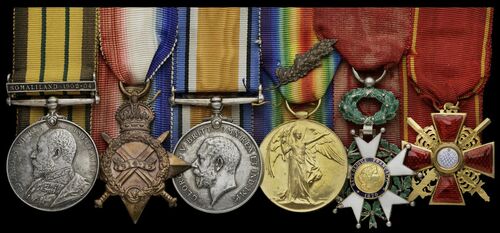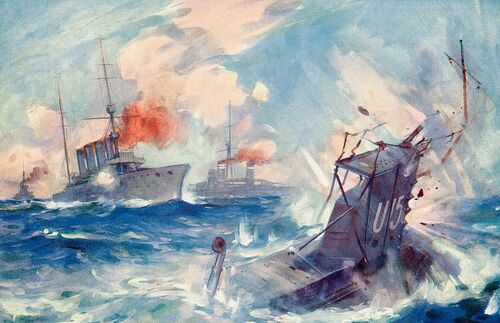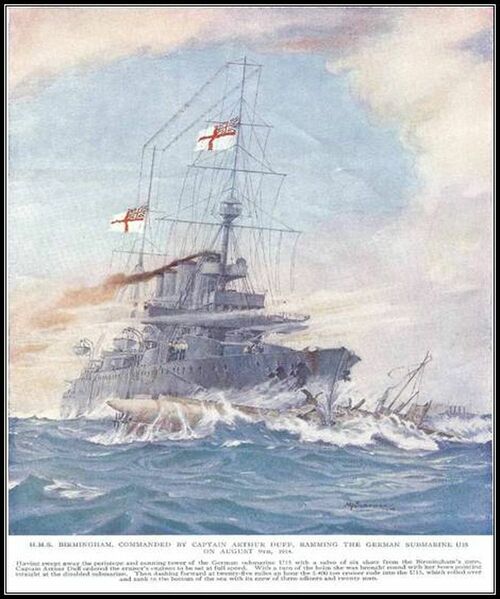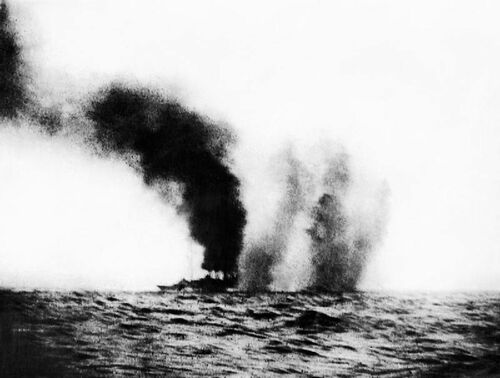Auction: 23001 - Orders, Decorations and Medals
Lot: 98
A very fine campaign group of six awarded to Engineer Captain J. B. Hewitt, Royal Navy, who was thrice decorated for his actions aboard Birmingham at the Battle of Jutland, also having shared in the sinking of the first German submarine of the Great War, when she put the U-15 to the bottom on 9 August 1914
Africa General Service 1902-56, 1 clasp, Somaliland 1902-04 (Engr. Lieut. J. B. Hewitt. H.M.S. Highflyer.); 1914-15 Star (Eng. Commr. J. B. Hewitt. R.N.); British War and Victory Medals, with M.I.D. oak leaves (Eng. Commr. J. B. Hewitt. R.N.); France, Republic, Legion of Honour, breast Badge, gold, silver and enamel; Russia, Imperial, Order of St Anne, 3rd Class breast Badge with swords, gold (56 kokoshnik) and enamel, gold mark to loop, reverse under enamel and on one sword hilt reverse, mounted court-style as worn, old repairs to this last, very fine (6)
M.I.D. London Gazette 15 September 1916. Jellicoe's Despatch for Jutland and recommended for early promotion and his services '...specially noted.'
French Legion of Honour London Gazette 15 September 1916 (Jutland).
Russian Order of St Anne London Gazette 5 June 1917 (Jutland).
John Benjamin Hewitt, an Engineering Student, was certified by the Civil Service Commission in June 1889 and was appointed to the Royal Navy in July 1893. Made Engineer Lieutenant in July 1898, he was advanced Engineer Commander in October 1910 and served in this rank during the course of the Great War.
Hewitt joined the books of Birmingham in December 1912 whilst she was still being laid down, and would have been present for her launching on 7 May 1913. She was eventually completed by January 1914 and was soon into action at the opening of the Great War - indeed she would have the honour of the first U-Boat 'kill' of the War. The U-15 had left for its first patrol on 1 August 1914, but on 9 August, U-15 was forced to lie stopped on the surface off the coast of Fair Isle, in Shetland, Scotland, after its engines had failed.
Whilst stranded on the surface, Birmingham spotted the boat through a thick fog and could hear hammering from inside as the crew tried to repair the damaged engines. Birmingham fired on her but missed and as U-15 attempted to dive to avoid the attack, Captain Duff ordered his ship to ram the submarine at full speed, cutting it in half and with the loss of all hands.
By the time of the Battle of Jutland, Birmingham was part of the 2nd Light Cruiser Squadron, commanded by Commodore Goodenough - their role in the early stages of the battle was as a scouting force for Beatty's battlecruisers and indeed it was this Squadron which confirmed the sighting of the High Seas Fleet for the British. They came under the guns of the German fleet for over an hour during this period, but were able to frustrate enemy efforts with careful manoeuvring and none of the British ships took a single hit - this no doubt as a result of men like Hewitt.
During the night of 31 May they encountered a German Light Cruiser Squadron and a short skirmish was fought: fortunately Birmingham had not raised her lights and as such was not caught in the enemy fire which so badly raked Southampton.
Hewitt gained his three awards for his part in this famed battle and was made Engineer Captain upon retirement on 18 July 1922. He was also a keen archaeologist in his spare time; sold together with copied research.
Subject to 20% VAT on Buyer’s Premium. For more information please view Terms and Conditions for Buyers.
Sold for
£2,600
Starting price
£1100











